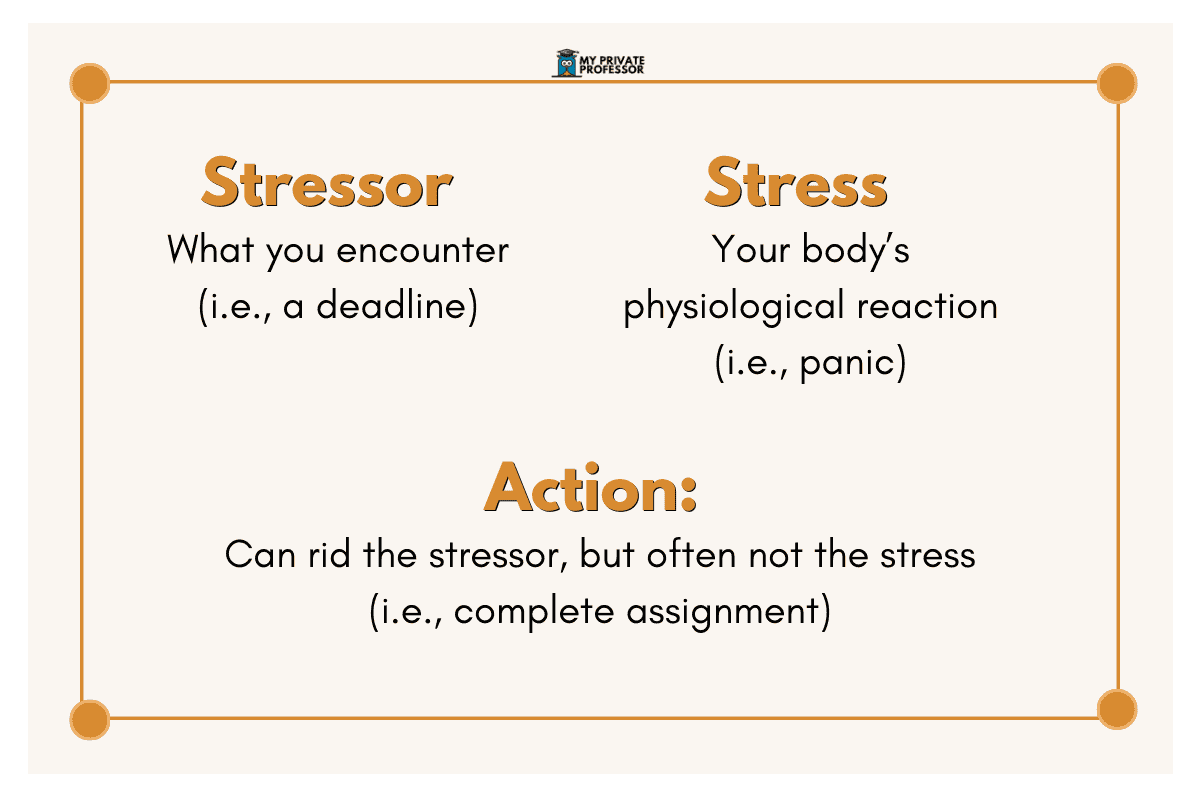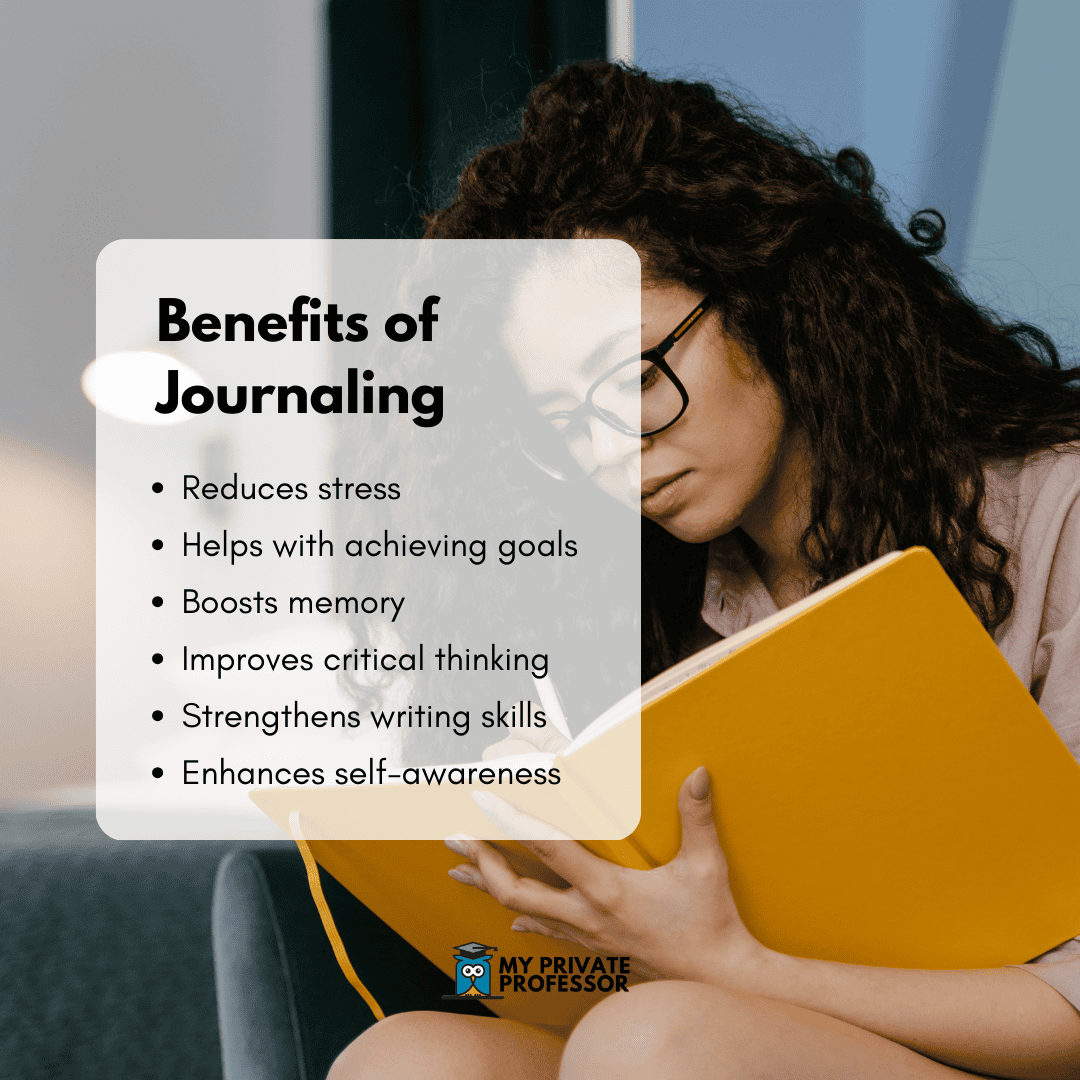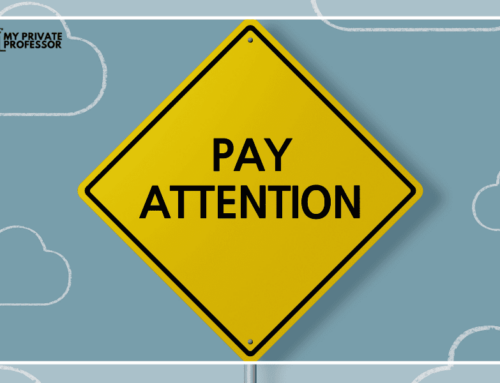Since the age of eight or nine, I’ve loved journaling. Truth be told, I always loved feeling like I was Harriet the Spy, scribbling away in the classic black and white composition notebooks.
As I got older, I continued to use a journal, where I would document my days, reflecting on playdates and sleepovers, and describing all the things that went wrong at my birthday party.
Around maybe age thirteen, I stopped journaling — and I have no idea why!
Flash forward to a few years ago, and at some point, something spurred me to start journaling again.
As I’ve nurtured this new-old hobby, I’ve realized all over again that journaling is one of the simplest, yet most powerful (and virtually free) tools that can help us navigate life. And I’ve also recognized that journaling is something from which a particular group of people will likely benefit: students.
The two — academic success and journaling — may seem unrelated. But, as I’ll detail below, journaling can provide students with several health and wellness benefits that can primarily enhance their day-to-day lives, but ultimately, help them achieve their highest potential in school.
Journaling helps students embrace the unknown
We can all admit that we’ve had our moments where we’ve been unwilling to admit we’re wrong. And largely, this is because as humans, we tend to avoid being wrong.
One of the reasons for this is that when we come face to face with an unknown, we experience stress. In fact, one study found that among participants, both subjective and objective measures of stress were at their highest when uncertainty was at its highest.
Meanwhile, research has shown that any component of unpredictability significantly increases our discomfort.
There’s a reason why, every now and then, we’ll get into an argument with someone (often someone close to us) and it’ll go on forever, even though, at a certain point, you may realize that you were, in fact, wrong. And it’s only years later, perhaps after you’ve had a major ‘a-ha’ moment, or have simply decided to grow up, that you admit that you were wrong.
And this can happen to anyone (regardless of whether or not you’re the most self-proclaimed, open-minded Aquarius). It seems that resisting being wrong is embedded in our human DNA.
When we realize that we have been wrong about something, we feel as though we’re coming face-to-face with a threat.
That is, a threat to our — sometimes fragile — identity and ego.
As research shows, when we realize that there’s a disconnect between what we thought to be true, and what is actually true, we feel uncomfortable. And so our typical reaction is to stand firmly with our original opinion.
When you journal, you’ll find that it’s easier to be honest about those gaps in your knowledge on the page than to a friend or family member. As a result, you can expand your perspective. This, in turn, can open the door for developing more ideas, creativity, and connections with others.
Journaling helps students release their thoughts, feelings, and anxieties
One thing I realized when I began journaling again was that, after a journaling session, I almost immediately noticed that I felt more mentally clear. And prior to making this a regular practice, I was so skeptical about this being a truly effective tool for everyday life.
Emotional health and wellness
But research shows that, in fact, expressive writing can result in an immediate increase in distress and negative feelings.
One of the reasons for this is that journaling propels us to release the thoughts and/or feelings that are weighing on us heavily.
When we journal, we tend to naturally unload all that we’ve been holding inside.
Whether you’ve been stressing about an upcoming presentation, or wondering about what your true passion is, the thoughts that have been weighing you down will float up and onto the page when you journal.
And often, those are things that you’re keeping inside because they seem too scary to deal with. But once you acknowledge that something scary, and detail you feelings about it, you’ll likely feel a little lighter.
Additionally, when you allow yourself to recognize what you’ve been feeling, you become more inclined to accept and eventually embrace those feelings. Because usually, you realize that identifying our feelings (even if, and especially if, they’re negative) leads to making positive changes.
And sure enough, research has found that when we put our negative feelings into words (whether on the page or to a friend), we have an easier time healing.
Journaling helps students achieve their goals
When journaling, we can unload all those heavy thoughts and feelings. Once we’ve done that, we tend to go to the planning. That is, we’re inclined, subconsciously, to identify the areas in our life with which we’re not satisfied, and think about what we can do about it.
This is related to cognitive dissonance, which is an internal feeling that we experience when we identify a gap between where we are and where we feel we should be.
When I’m journaling, I often circle back to some of the same ideas or problems during most sessions. And keep in mind, when I journal, I pretty much never have a fixed prompt or plan. Yet, I still find myself writing about a few of the same things. One of these things is a recurring desire to allow myself more moments to simply let my thoughts wander (in a distraction-free zone).
When I do find myself writing about this, I usually also find myself writing about how I’m going to get there. This can boil down to things like:
- Small, achievable goals
- Overarching, larger goals
- Daily steps to achieve goals
- Ways to overcome relevant hindrances
Journaling opens a gateway that leads us to create roadmaps toward our goals. And in doing this, journaling can also help us anticipate potential challenges, and plan for getting around them.
For students, journaling can help with achieving goals in school, on their sports team, or in their circle of friends. Once they identify areas where they feel they need some improvements, students can use journaling to help them think about actionable steps they can take to see these improvements.
Journaling helps students with stress management
Students have so much to balance every day, continually focusing on different subjects and juggling between different types of tasks.
For many students, there just doesn’t seem to be enough time in the day to get everything done — let alone, to process all of their emotions that come with various stressors.
Authors (and sisters) Emily and Amelia Nagoski have proposed that journaling is an effective tool for what they call “completing the cycle.” The “cycle” really just refers to the common process of accumulating stress throughout our days.
The Nagoski sisters touch on the importance of completing the cycle in order to rid yourself of the effects of stress. Once you’ve completed the cycle, your body knows that it’s not anymore in the presence of a threat (the stressor).
One thing to recognize here is that completing the cycle serves as a way to deal with not the stressor, but the stress itself. And the two, unbeknownst to many people, are not one and the same.
The stress vs. stressor
Imagine, for example, that you have a fifteen-page paper that somehow slipped your mind until the night before the due-date. In the middle of dinner, you suddenly remember, and immediately experience a wave of panic and ensuing stress.
At this moment, we’re looking at both a stressor and stress. The stressor is the event or situation that causes you to feel some type of way (in this case, those feelings are panicked and probably feelings of overwhelmingness). Meanwhile, the stress is the feelings themselves.
When you experience stress, you’re likely going to want to rid yourself of these feelings. And one of the ways that we do this, as humans, is by executing an action. In this case, that action will likely be running to your desk and scrambling to somehow pull off writing a fifteen-pager in one night.
As the Nagoski sisters explain, when we act to reduce our stress, we focus on ridding ourselves of the stressor. But, the stress itself stays trapped inside.
By doing things that complete the cycle, like journaling, we experience the great liberation that occurs when we allow ourselves to feel and process, and then release our feelings. And the result is that we’re no longer holding onto stress, which further allows us to go into the next day and our next endeavors with a better mindset.
- Stressor: what you encounter
- Stress: your body’s physiological reaction
- Action: can rid the stressor, but the stress stays inside of you
Journaling helps students develop problem-solving skills
One of the greatest results of journaling is finding that you feel more equipped to overcome challenges in your life.
When I journal, these challenges just seem to naturally come tumbling out onto the page. And while I might initially feel frustrated or stressed, as I continue getting my feelings out, something interesting follows.
What it is is this almost immediate urge towards action. My brain begins putting two and two together — and as a result, unraveling my scattered thoughts.
For instance, I often try to write honestly about areas in my life that could use improvements. One of these areas is maintaining focus during work. I frequently find myself writing about how I’m succumbing to distractions during my work day (doing puzzles on my phone, scrolling through Instagram). And consequently, I find myself writing about what’s causing this behavior and what I can do to counteract it.
Don’t get me wrong — being honest on paper doesn’t immediately solve all issues. But it does make you more hyper-aware about your behavior.
In my own experience, after having journaled, when I notice the urge to take yet another break to do a crossword puzzle, I am more conscious about monitoring my time during this break instead of passively spending two hours on the puzzle.
Often, the habits we’re trying to break are somewhat automatic. Which is why they can be so difficult to break! This is why, in order to actually make a dent in the issue, you need to do something that allows you to be more aware of the problem and in turn, more steadfast in your efforts to make changes.
Journaling empowers students to be present
Sometimes my thoughts may be running amok, and usually, there are a few options to help counteract this. I can let my thoughts keep stewing, I can try to distract myself with a movie or book (that often helps, but only in the short-term), or I can get my thoughts out on paper.
I’m not going to lie and say that I’m perfect and that I always resort to that third option. But I find that when I do journal, I feel less pulled in different directions (from my thoughts), and more able to be present. .
I think, to some extent, this is due to the way in which journaling allows you to get closure. And of course, you get that release that I mentioned previously. Yes, the problem might still exist. But for the moment, you’ve unloaded your thoughts and feelings, and from there, you can make steps to move forward.
When students are more present in school, teachers will likely see more dynamic class discussions and higher levels of engagement.
In fact, research has found that when teachers implement some form of journaling in the classroom, they see students being more present and engaged. 
Tips
Try gratitude journaling
If students are having trouble figuring out where to start, using gratitude journaling can be helpful. Gratitude journaling is really exactly what it sounds like. It’s simply journaling with a focus on things that you’re grateful for.
Usually, this works out to be three to five items, but students can really take it and run with it.
This tool can help students not only get started with journaling, but also, it can inspire them to show gratitude; as research shows, practicing gratitude can help with reducing depression and improving self-esteem.
So by journaling and then showing gratitude, students can significantly enhance their mental well-being. As a result, they will be more likely to take on academic challenges with a confident and positive attitude.
Use the five-minute journaling method
If students prefer a more structured method, they can purchase a specific type of gratitude journal, the Five Minute Journal.
The Five Minute Journal is specifically designed for gratitude journaling, and contains pages with six months’ worth of daily entries. Meanwhile, it includes some information about the benefits of positive thinking, and tips for how to use the journal. This journal provides students the space to discuss their plan for achieving journaling goals, which helps with accountability.
Final thoughts
Directly, journaling provides students with health and wellness benefits. But ultimately, these perks also elevate their learning.
By encouraging journaling, parents and teachers can help students establish a healthy outlet for when they feel stressed or overwhelmed.
Then, students can show up in the classroom with more energy to put towards fully engaging at school.







